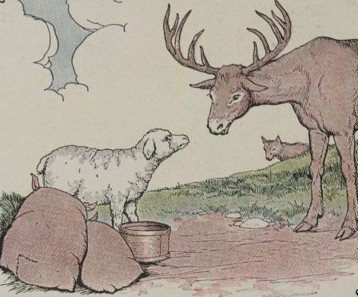PART A_1
Let’s learn vocabulary. Listen and repeat the words and the sentences with your tutor.
PART A_2
| 1. stag | /stag/ |
| -an adult male deer | |
| They stopped the car when they saw a stag crossing the road. | |
| 2. swift | /swift/ |
| -happening or moving quickly or within a short time, especially in a smooth and easy way | |
| I did not expect such a swift reply. | |
| 3. surety | /SHUR-i-tee/ |
| -a person who accepts legal responsibility for another person’s debt or behavior | |
| I acted as a surety when my sister applied for a loan. | |
| 4. indignantly | /in-DIG-nuhnt-lee/ |
| -in an angry way, because of something wrong or not fair | |
| They indignantly denied the accusations that were said to them. | |
| 5. debt | /det/ |
| -something, especially money, that is owed to someone else, or the state of owing something | |
| He had to pay huge debts because of his gambling addiction. |
PART B_1
Let’s read the story. Please read it aloud, and I will check your pronunciation and intonation.
PART B_2
The Stag, the Sheep, and the Wolf

One day a Stag came to a Sheep and asked her to lend him a measure of wheat. The Sheep knew him for a very swift runner, who could easily take himself out of reach, were he so inclined. So she asked him if he knew someone who would answer for him.
“Yes, yes,” answered the Stag confidently, “the Wolf has promised to be my surety.”
“The Wolf!” exclaimed the Sheep indignantly. “Do you think I would trust you on such security? I know the Wolf! He takes what he wants and runs off with it without paying. As for you, you can use your legs so well that I should have little chance of collecting the debt if I had to catch you for it!”
Two blacks do not make a white.
PART C_1
Let’s answer comprehension questions. Please answer them based on the story.
PART C_2
| 1. | Why did the Sheep doubt the Stag? |
| 2. | What did the Stag say to the Sheep so he could owe some wheat? |
| 3. | What happened when the Stag told the Sheep that the Wolf will be his surety? |
PART D_1
Let’s discuss the story. Please answer the questions below and express your opinions.
PART D_2
| 1. | Do you think the Sheep made the right decision? Explain your answer. |
| 2. | How would you describe the Sheep in the story? |
| 3. | How would a person know if someone is playing tricks on him/her? |
| 4. | What is your understanding of the fable’s lesson? |
| 5. | Have you had an experience similar to the fable’s lesson? Tell me more about it. |
REVIEW AND FEEDBACK
Now, let us review the things that you learned in this lesson.
ではこのレッスンで学んだことを振り返りましょう。
(Please give a short feedback on how your student did on your class.)
| Grammar 文法 |
Pronunciation 発音 | Vocabulary 単語 |
Comprehension 理解 |
|
|---|---|---|---|---|
 GOOD GOOD |
文法の誤りはほとんどなく、完全な文章で話すことができる | ほとんどの単語をはっきりと正しく発音することができる | 習った表現を適切に使うことができる | 文章を理解し、質問に正しく答えることができる |
 FAIR |
文法の誤りはあるが、完全な文章で話すことができる | 発音の練習が必要な言葉がいくつかある | たまにミスはあるが、習った表現を適切に使うことができる | 文章を完全に理解するのは難しく、質問に正しく答えられないときもある |
 POOR |
文章で話すのは難しく、単語だけで話すことができる | 発音の練習が必要である | 習った単語と表現を少しだけ使うことができる | 文章を理解するのは難しく、質問に答えるのは難しい |
Parts of this lesson material are based on:
An eBook from The Project Gutenberg.
This eBook is for the use of anyone anywhere at no cost and with almost no restrictions whatsoever. You may copy it, give it away or re-use it under the terms of the Project Gutenberg License included with this eBook or online at www.gutenberg.org
An eBook from The Project Gutenberg.
This eBook is for the use of anyone anywhere at no cost and with almost no restrictions whatsoever. You may copy it, give it away or re-use it under the terms of the Project Gutenberg License included with this eBook or online at www.gutenberg.org